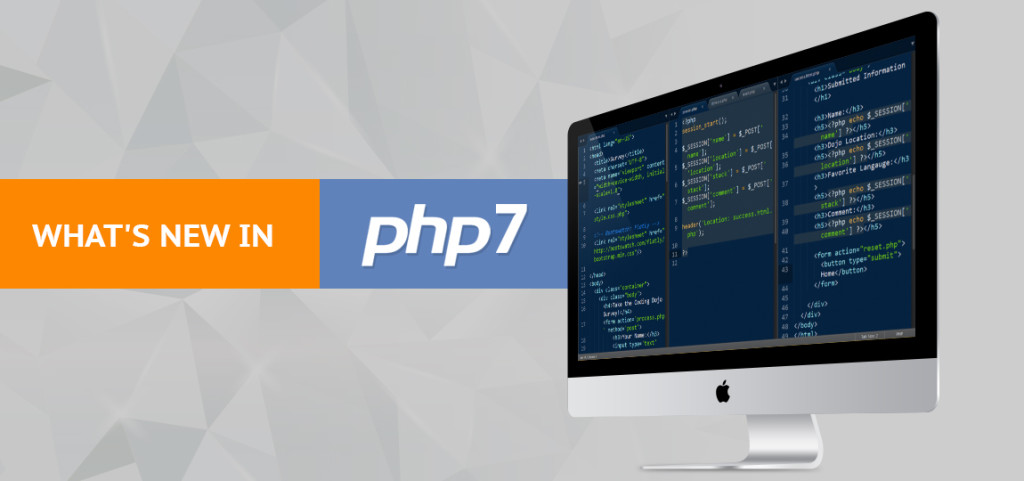An Introduction To PHP7
Since inception, PHP has been acclaimed as the one of the best server side scripting language, powering almost 200 million websites so far. This is just not an end, 81.7 percent and more of the public websites are powered by PHP on the server side. And after a long time, the core community of PHP took an ultimate step of introducing PHP7 for establishing its niche in sustainable PHP development for future.

Though this version significantly took a longer time to come into the light, but after knowing its features, one will definitely say that it was worth waiting. The last release of PHP before PHP7 was in 2004 of PHP 5.0 which too was widely accepted and accoladed.
If you are among the ones associated/engaged with WordPress, Drupal, Magento or any other PHP powered CMS in any way, then for sure PHP 7 is a good news for all of you out there. Let™s explore and know more about PHP7 in this post.
The Brains Behind PHP7
Being under beta testing for several months, PHP 7 is now released for public use. The masterminds behind the new discovery were Dmitry Stogov, Xinchen Hui, and Nikita Popov. They originally developed an experimental PHP project and named it PHP Next Generation, which is often abbreviated as PHPNG.
Seeing the improvements, new features, and leveraged performance, the core community of PHP diligently accepted this new experiment and soon offered to create its stable version next. After several months of dedication and hard work, these ardent contributors came up with PHP 7.
What Happened To PHP 6? Did You Miss It!!!
Ohh.. Well, not exactly! You did not miss the PHP 6. Here is why… Actually in the year 2005, the core community of PHP began with the process of developing PHP 6, but no sooner the process had to be stalled. Why? Well, that™s a long story which we will discuss later. For now, it™s enough to know that PHP 6 did not meet the expectations and had many complications which in no state could be released for public use. And, to recover the damage done by this version, a new version of this programming language is introduced which is named as PHP 7.
Let™s Take A Glimpse To The Newly Added Features Of PHP 7
Here is the list of features specifically integrated into PHP7. Check if they are all included in your expected checklist of this new version.
- Huge Performance Improvements: Number of criticism have surfaced lately related to the glitches in the performance of PHP. Never mind, the issue has been actively resolved in this new update. The performance score is now tripled from its previous versions and all this is done through PHPNG project. This PHP Next-Gen boosts the functioning of real-time apps and websites up to 50%.
- 2X Faster than PHP 5.0: It is claimed that PHP 7 runs almost twice as fast as its previous version. It requires less servers to execute codes for functioning. The best example is WordPress homepage that now requires nearly 72% lessened coding instructions from CPU, using PHP7. It also comprehends an optimized Zend Framework contributing to the swift processing of PHP 7.
- Brand New Operators
PHP 7 comes with two new operators namely Spaceship (Combined Comparison) and Null Coalescing. The Spaceship operator (<=>) is capable of making the chained comparisons and gives value returns. Like if the value on either side is equal, it will return 0, if the value on the left side is greater/ lesser, it will give 1 and -1 consecutively. While, on the other hand, Null Coalescing operator (??) will compare the presence of component and then give results. It depends on the default variable amount which determines the results accordingly. Well, these tasks were definitely performed previously, but not with the same perfection as in PHP 7.
- Scalar & Return Type Hints
This new PHP version allows developers to use Booleans, Strings, Floats, and Integers as type hints for many different functions. The developers will now have an option to declare (strict_types=1) for every file, which will initiate all the functions and return calls in a statement to have strict type-checking for scalar type declarations which will include extensions and inbuilt PHP functions. It will return any wrong type function declared which will prevent any unexpected error in the codes.
Let us understand this new feature with an example:
Scalar type Hints
Scalar type hints ensure input consistency. With reference to the features introduced in PHP7, it allows a better input consistency of a function/method interface. By default coercive mode is set which restricts PHP from entering a type which does not match the function and shows error.
And now if you enable the strict mode, a type error is shown mentioning the unmatched signatures.
Example:
1 | <!--?php declare(strict_types=1); function addition(int $var1, int $var2) { return $var1 + $var2; } var_dump(addition(2,2)); var_dump(addition("2","2")); ?--> |
Return type declarations
Return Type hints ensure output consistency. In order to hint the return type, use a colon in the beginning of curly bracket. As like scalar, same strict mode declarations are shown in return type.
Example
1 | <!--?php declare(strict_types=1); function addition(int $var1, int $var2) : int{ return $var1 + $var2; } var_dump(addition(2,2)); ?--> |
- Engine Exceptions
Error handling is made easy in PHP7, with the integration of powerful Zend Engine framework. And, now the process of managing and resolving the existing and new errors too gets easy with Engine Exceptions. This helps in finding and replacing the fatal errors at the right time.
Here is an example to understand it better:
1 | <!--?php function test_call($object) { $object->method();</p> <p>}</p> <p>test_call(null);<br ?--> ?> |
As of now, this above code will show a fatal error. So, PHP7 will replace this error with an EngineException. The fatal will continue to show until and unless a required exception is found.
1 2 3 4 5 6 7 8 9 | try { test_call(null); } catch (EngineException $e) { echo "Exception: {$e->getMessage()}"; } |
- Extensive 64-Bit Support
PHP was predominantly designed to function with Linux, but with advancement, it is now functional with Windows-enable system. The previous versions of PHP were not compatible with large files or 64-bit integer. But with this new version 7, there is an extensive 64-bit support which helps in efficient functioning of PHP on the Windows system with 64-bit.
- Use Declarations
PHP 7 comes up with a new concept called Group Use Declarations which allows you to access multiple namespaces at one place. It also improves the functioning and implementation of PHP namespace using the latest syntax. No to mention, this new feature will make codes precise and readable, thereby saving a lot of time of developers.
With the help of use declarations, it has become easier to import classes, constants and functions in a precise way. It allows an ease of importing multiple structures from a common namespace, thus cutting down verbosity in many cases. It also helps in identifying if multiple imported entities are drawn from the same module.
Use test\namespace\classname
use test\namespace\ClassA
- Compatible With Anonymous Classes
The new version of PHP allows the user to use anonymous classes into the codes, just like in other programming languages like Java and C#. Evidently, a class having no name is called anonymous class. These classes are highly recommended as they improve coding and leverage the execution time of coding.
- Abstract Syntax Tree (AST)
The introduction of Abstract Syntax Tree (AST) is a big change made to the core functionality of PHP. AST is majorly beneficial for developers and not for the users. The inclusion of this new feature is ready to serve many benefits like improved scope for optimization, usage of tools, semantic coding, etc.
- Non-essential Items Removed
The removal of condemned and unwanted functionalities, server API™s, and extensions has been deleted from this new PHP version. Here are some components that have been removed from PHP 7 namely: ASP style tag, ereg, MySQL extensions, PHP4 style constructors, etc.
What To Do Next?
Now, since this new update of PHP is out, you must be planning to migrate your WordPress website to PHP 7. Here are some features that you must ponder during PHP 5 to PHP 7 migration:
1.Get Notified
Since this is the latest updates with lots of new features and improvements, it requires a specific environment, functionality, and extensions to work effectively. So make sure you are getting notified by the host provider of any new updates and changes. If you find anything wrong, immediately contact to your service provider.
2.Create A Backup Of Your WordPress Site
There have been instances where the existing themes and templates do not work compatibly and also lead to site break down. There are guidelines for all WordPress authors specifically laid to avoid any outages or issues related to site migration from PHP 5 top PHP 7. It is better to create the backup of your WordPress website before initiating the migration process.
3. Always Keep Your Website & Its Components Updated
Before beginning with the migration process, make sure all the elements like themes, plugins, extensions and the WordPress site itself are updated. This is done to avoid the situation when these elements stop functioning during PHP update. Remember, if any of the element is not responsive to the new version, then definitely it is not required with your newly updated language.
4. Contact Hosting Provider
Always keep the contact of your hosting provider handy with you, so that they can assist you on prior basis. These dedicated service providers are professional and competent and hence, provide extensive dedicated support to your website.
Conclusion:
PHP 7 is a major update in comparison to its preceding version PHP 5.6. Before upgrading your site code from PHP 5.6 to PHP 7 includes an effective analysis of incompatibilities, both in the codes and libraries define the codec structure of your website. PHP 7 is undoubtedly faster, better and smarter!





